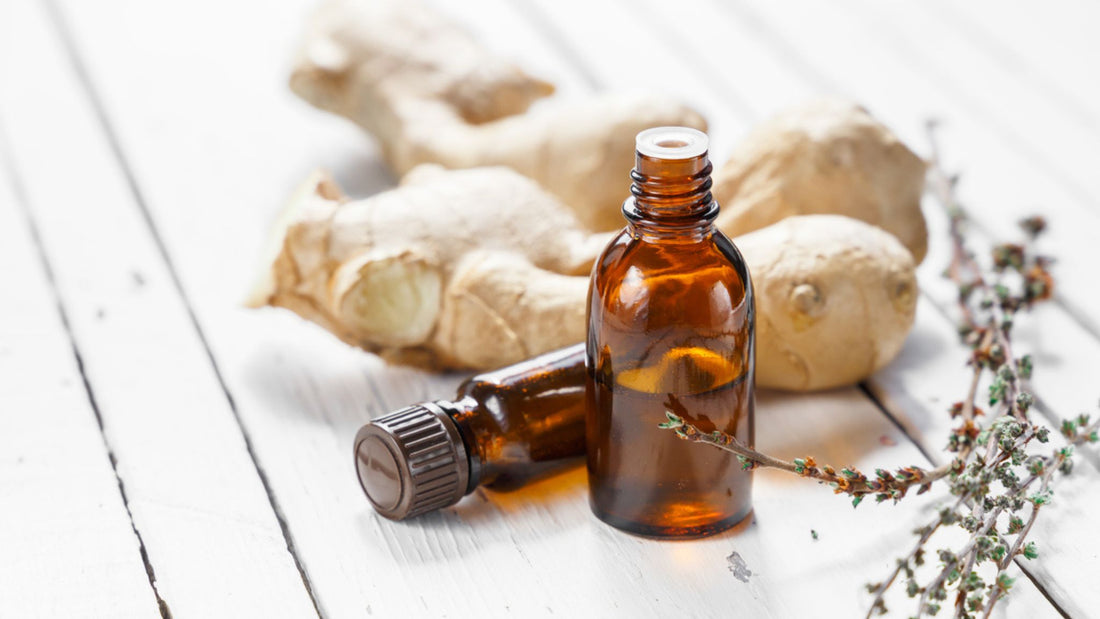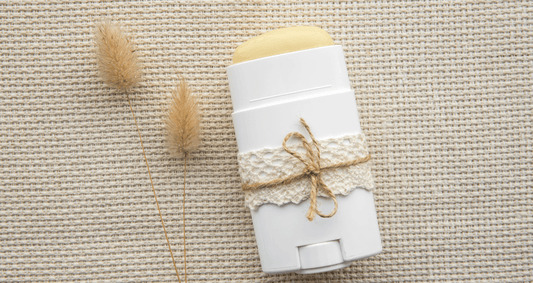Best known as a wintery spice or soothing tea, ginger has long been used in traditional medicines. In this guide, we give you an overview of the health benefits of ginger essential oil.
Take a look at the essential oil’s history in aromatherapy, the main claims and scientific studies, and our recommended uses.
Contents
Ginger oil in aromatherapy
Ginger essential oil is extracted through steam distillation from the root of the ginger plant. It was originally discovered in Southeast Asia over 5000 years ago. In the 1st century, traders took ginger root to the Mediterranean regions where it was used in natural remedies for its health benefits and gained popularity to aid digestion.
Ginger essential oil is also used for its therapeutic properties to ease nervousness and anxiety in aromatherapy. Topical application is said to treat nausea, relieve sore muscles and reduce joint pain. There are also some claims ginger essential oil is antibacterial.
These key texts state the following uses of ginger essential oil:
-
The Practice of Aromatherapy by Dr J Valnet 1980: Pain relief, Rheumatism, Sore throat
-
The Fragrant Pharmacy Valerie Ann Worwood 1991: Massage recipe for sore muscles, antibacterial.
-
The Essential Blending Guide by Rosemary Caddy 2000: Baby teething, Back pain, Diarrhoea, Indigestion, Osteoarthritis, Sprains
The recommendations involve diluting a few drops of the essential oil blend in carrier oils for safety – which we’ll get onto next!

Ginger oil safety
Like other essential oils, ginger essential oil should only be applied to the skin when it’s diluted in a carrier oil.
If you’d like to add essential oils to your bath you need to use a solubiliser, like Polysorbate 80, to help the oils mix into the water. Otherwise, the essential oil will float on top of the warm bath water and can irritate your skin. Not what you want when you’re trying to unwind.
You should use equal parts of essential oil to polysorbate. So if you’re going to add 5ml ginger essential oil to a bath, you need to mix it with 5ml of polysorbate 80. Then you can relax.
Ginger oil benefits: claims vs. evidence
These are the top 9 claimed benefits of ginger oil and the studies frequently used to back them up. We’ve given them a critical eye, so you’ve got all the key information to know when you try the essential oil for yourself.

1. Ginger oil for nausea
One of the most popular uses of ginger – whether it’s ginger biscuits, tea, or essential oil – is treating nausea.
In one large study of over 300 people, ginger essential oil was found to be helpful for easing post-operative nausea.
However, this is contradicted by a study that looked at postoperative nausea in children, which found ginger oil didn’t have a significant effect. This was a smaller study with only 39 people who took part.
KEY TAKEAWAY: Ginger essential oil might be an effective natural remedy in easing an upset stomach, but more studies are needed with consistent results.

2. Ginger oil for wrinkles
Anti-aging cosmetics is a huge industry and so it’s no wonder ginger oil has been boosted as a miracle ingredient for this too.
In a 2015 study, several essential oils, including ginger essential oil, were blended into a body cream and used by 29 participants for 4 weeks. The study showed a reduction in skin roughness and concluded that essential oils may prevent the signs of skin aging, such as wrinkles.
Really, the results of this study are most likely down to the hydrating effect of the cream they made.
KEY TAKEAWAY: There’s no quality evidence that shows ginger essential oil can reduce wrinkles.

3. Ginger oil for weight loss
We went all-in on busting this myth in our article on ginger for weight loss. To summarise, research shows that fresh ginger root or ginger powder may help you lose weight. As for ginger essential oil, there’s no proof whatsoever.
KEY TAKEAWAY: There’s no evidence that ginger oil can help you lose weight.

4. Ginger oil as an antibacterial
There have been anecdotal claims that ginger essential oil is antibacterial and scientific studies are beginning to see if they’re true.
This 2014 study found ginger oil compounds were effective against three strains of bacteria: Escherichia coli, Bacillus subtilis and Staphylococcus aureus.
This is a great start for the use of ginger oil as a natural treatment for bacterial infections, though more studies are needed to be sure.
KEY TAKEAWAY: The ginger compounds have been shown to be an effective antibacterial in the lab, but we’re yet to see the results in a real-life setting.

5. Ginger oil for stomach ulcers
Because of the history with ginger oils potential digestive properties, it makes sense to think it might be able to help stomach ulcers too. A 2015 animal study put this to the test.
The study evaluated the activity of ginger essential oil on rats with induced stomach ulcers. They were fed ginger oil every day and it was found that the ginger essential oil treatment inhibited the ulcer by 85 percent.
But just because it worked on rats, it doesn’t mean it’ll work the same on humans. Especially considering that if you convert the dosage the rats were given into a dosage for an 80kg human, you’re looking at consuming 8g, 40g, or 80g of ginger essential oil daily. That’s going to be bad for you, and isn’t the whole point to reduce stomach issues?
KEY TAKEAWAY: Well ginger oil did help reduce stomach ulcers in rats, but there’s no evidence it can get rid of stomach ulcers in humans.

6. Ginger oil for liver protection
There are some suggestions that ginger essential oil is Hepatoprotective (protects the liver).
This has been tested in a study on mice who were fed an alcohol-containing liquid diet to replicate Alcoholic Fatty Liver Disease (AFLD). They were administered 2.5kg or 12.5mg/kg their body weight of ginger essential oil diluted in olive oil.
The results show that ginger essential oil could have protective properties against AFLD. However, the oral doses scaled up to an 80kg human would be 0.2g or 1g daily, which likely isn’t safe to consume. We also do not recommend taking ginger essential oil internally.
KEY TAKEAWAY: While research shows that ginger essential oil can protect the liver in mice, we don’t know whether it’ll have the same result in humans.

7. Ginger oil for kidney protection
In a 2018 study on rats, ginger oil was shown to protect the kidneys against heavy metal damage.
The rats were given 50mg/kg of their body weight of ginger oil – the human equivalent is a daily dose of 4g, which isn’t going to be comfortable for anyone.
KEY TAKEAWAY: There’s some evidence ginger essential oil can protect the kidneys in rats but, like the other animal studies, that doesn’t mean it’ll be the same in humans.

8. Ginger oil as an anti-inflammatory
There are lots of suggestions online that ginger oil has anti inflammatory properties, but there’s relatively little evidence.
One 2013 study looked at the activity of ginger essential oil in mice. The results showed that the ginger oil significantly reduced acute inflammation in the mice, after being treated for one month.
This is supported by another mouse study that showed ginger essential oil can reduce inflammation, as well as a rat study that showed an essential oil treatment was effective in reducing inflammation caused by arthritis (see more below!). We still don’t have any evidence it works for people.
KEY TAKEAWAY: Animal studies show that ginger oil is an anti-inflammatory, but we don’t have any evidence this works for humans.

9. Ginger oil for arthritis
As mentioned above, one study on rats showed an oil treatment, which included ginger essential oil, was effective in reducing inflammation caused by arthritis.
The arthritic rats were treated with an ointment containing 16 different essential oils at a high concentration and developed less severe arthritis compared to the controls. The activity was attributed to the essential oils, not the carrier oil, although it’s impossible to determine which essential oils played a greater role.
KEY TAKEAWAY: From the current research, we can’t tell whether ginger oil helps treat arthritis in humans.

How to use Ginger Essential Oil
As you can see from the studies above, there’s not enough evidence for us to confidently tell you to use our organic ginger oil to protect your liver or treat an upset stomach.
That said, there are plenty of ways we recommend using this natural ingredient – its best property, after all, is its warm and spicy scent.
Here are a couple of our favourite blends with ginger essential oil:
Citrusy and spicy blend:
5 drops Organic ginger essential oil
8 drops Organic orange essential oil
7 drops Organic bergamot essential oil
10 drops Rose absolute essential oil
Ginger and floral blend:
1 drop Organic ginger essential oil
2 drops Organic lemon essential oil
2 drops Organic lavender essential oil
Or check out this recipe to make your own bath salts. Using all natural ingredients, this is an easy way to soothe your mind and relax your muscles after a long day.

Final thoughts
Research into ginger oil benefits indicate that it can be helpful as a natural remedy to ease the feeling of nausea and that it has anti-inflammatory properties. However, most of the potential health benefits of ginger are backed up by animal studies, so we can’t know for sure whether they’ll have the same effect on humans.
Ultimately, there’s no single ingredient, essential oil or not, that’s a miracle worker. And when it comes to ginger oil, we simply don’t have enough evidence yet to fully fact-check all of the benefits of ginger essential oil.
That’s not to say it won’t work for you. It has a comforting scent and many people diffuse ginger oil for aromatherapy, or add a few drops of ginger oil to a warm bath. It can also be applied in cosmetics and in a massage oil. We've given you some suggestions so you can discover your own benefits.
If you’re applying it to the skin, remember to dilute it in a carrier oil first.
Continue reading
Now that you've learned about ginger essential oil for skin and health conditions, why not continue reading?
-
Learn how to make cold process soap with our avocado oil soap recipe!
-
Interested in learning more about our other essential oils? Check out our blog about rosemary oil for hair growth.
-
Want to learn how to make a hot process soap? Try our easy hot process soap recipe using coconut oil!
If you love using ginger oil or have found this guide helpful, let us know in the comments!



